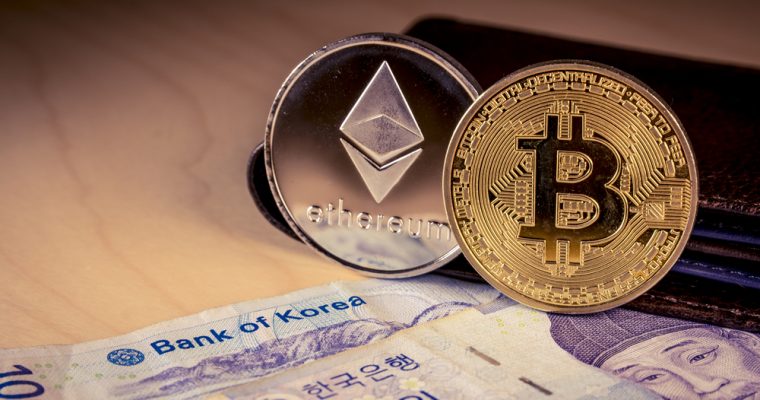Bitcoin’s price has been on a fall since last sunday, when the cryptocurrency lost about 10% of its value in little more than a day. As usually, bitcoin’s price loss reflected on other cryptocurrencies as well, and at the time of writing all major cryptocurrencies are experiencing significant losses of over 5%.
At the time of writing bitcoin is exchanging for around 6 600 dollars. This is lowest bitcoin has been in over two months.
Reasons for this drop are varied. Many mainstream publications have blamed the hack of South Korean exchange Coinrail, which resulted in theft of over 40 million dollars worth of cryptos. But new research shows that this might not be the case.
The current fall in cryptocurrency prices has been going on more or less since the end of December, when bitcoin reached its all time high of over 20 000 dollars. After January the prices have been on steady decline, suggesting a more profound reason than a simple hack.
 For a perceptive investor, price fall could mean a cryptocurrency sale.
For a perceptive investor, price fall could mean a cryptocurrency sale.
New Research Attributes the Bitcoin Fall to “Hodlers”
The blockchain-analysis company Chainalysis and Financial Times ave published a new research article concerning the developement of bitcoin’s current price. According to the article, the current price drop cannot solely be attributed to so-called “weak hands” – that is; investors who eye on quick gains and are mainly interested in speculation.
The article suggests that last December, when bitcoin’s price peaked over 20 000 dollars, was the beginning of a sell off by the so-called “hodlers”. “To hodl” is Internet-slang, which has come to mean holding on to one’s cryptocurrency even in the time of turmoil. In their research Chainalysis defines “hodler” as an owner who has held on to their bitcoin for at least a year.
“This was an unprecedented sell off and such an opportunity is unlikely to be repeated soon,” Chainalysis writes.
Even though the sell off might have caused the lowering price of bitcoin, it is not entirely without its benefits. Previously bitcoins were concentrated on few hands, but with sell off more and more people own bitcoin. This decentralization of property makes bitcoin more resistant against price manipulation by big players.
 In the short term this shift of bitcoin owning might mean that the prices won’t recover as fast as they used to, but in the long term it’s beneficial for bitcoin, for it takes away the ability of few players to manipulate the markets.
In the short term this shift of bitcoin owning might mean that the prices won’t recover as fast as they used to, but in the long term it’s beneficial for bitcoin, for it takes away the ability of few players to manipulate the markets.
Coinrail Hack the Fifth Major Cryptocurrency Theft This Year
A South Korean cryptocurrency exchange Coinrail has reported that it has been a victim of a hacking attack. According to Coinrail the hackers managed to steal over 40 million dollars worth of cryptocurrency.
“Seventy percent of total coin and token reserves have been confirmed to be safely stored and moved to a cold wallet. Two-thirds of stolen cryptocurrencies were withdrawn or frozen in partnership with related exchanges and coin companies. For the rest, we are looking at it with an investigative agency, related exchanges and coin developers,” Coinrail states.
Attack on Coinrail was fifth major hacking concerning cryptocurrency exchanges that has occured this year. During the year, hackers have managed to steal over 0,7 billion dollars in cryptocurrencies from various exchanges.

Though Coinrail was somewhat smallish exchange, it’s hack gained lots of mainstream attention, which might have contributed to recent price crash.
Banks Are Spending Billions on Blockchain, Still Losing
Management consulting company Greenwich Associates has been studying how banks spend on blockchain and has released its findings. According to the company, investing on blockchain is growing intensely, reaching about 1.7 billion dollars per year.
The study shows that blockchain budgets of banks have increased about 67% last year. Also 1 in 10 banks and other financial institutes are now reporting blockchain budgets of over 10 million dollars.
Moreover it seems that banks are finally moving onwards from just research to launching full on, working blockchain products of their own.
“More than three-quarters of projects currently under development are expected to be live within two years,” the report stated.
Main reasons for bank’s and financial institutes interest in blockchain technology comes from its possibilities of reducing costs: blockchain is faster, more reliable and far more cost-effective than the traditional ledgers.
Nonetheless report also suggests that banks are on the losing side of the new emerging financial technologies. Non-bank operatives have taken 40% of the consumer-to-consumer cross-border payments from banks. Banks have also lost 5%-30% of the consumer-to-business payments markets.

Banks try to harness the new fintech to their own ends, but since the revolution is essentially decentralized, it might still spell the end of their monetary dominion of the last centuries.
South Korea Regulates and Legitimizes Cryptocurrency Exchanges
The Korean Financial Unit has revealed details on how new Korean regulations will affect bitcoin and other cryptocurrency exchanges. In a policy advisor council meeting, the Financial Unit director Kim Geung-ik told that South Korean officials will regulate cryptocurrency exchanges like banks.
“Under current regulations, there are clear limitations in preventing money laundering on crypto exchanges because the only way authorities can spot suspicious transactions is through banks. If the bill of lawmaker Jae Yoon-kyung from the Democratic Party of Korea passes, local authorities will be able to impose identical regulations on crypto exchanges that are implemented on commercial banks,” another Financial Unit spokeperson told.
Although the new laws would mean somewhat stricter rules on how exchanges operate, it would also mean a grand step in legitimizing the industry. Historically banks, financial institutions and other companiens have been somewhat negative towards cryptocurrency companies, using the grey regulatory area as an excuse to refuse doing business with cryptocurrencies. With new rules this could change.
Regulation could also cast the public’s view towards cryptocurrencies in more positive light. In Japan the regulation and legitimization of cryptocurrencies caused a massive surge in consumer interest of bitcoin and other cryptocurrencies. As South Korea’s future legislation is in many aspects similar to that of Japan, a likewise occurrence might also happen in South Korea.
 If South Korea’s future regulation has the same effect as Japan’s had, it could mean a surge of new demand for cryptocurrencies.
If South Korea’s future regulation has the same effect as Japan’s had, it could mean a surge of new demand for cryptocurrencies.
One of the Biggest Shopping Center’s in Europe to Become “BTC Hub”
A major Slovenian shopping center is launching a pilot program on cryptocurrency payments. The shopping center, BTC City Ljubljana, will allow a group of 150 people to use cryptocurrencies at 24 businesses in their shopping mall, which is one of the largest in Europe.
Even though the center has a fitting name for such a pilot, the “BTC” in “BTC City” is not related to Bitcoin at all. This “BTC” stands for “Blagovno Transportni Center”. It has more than 500 stores in its territory. The shopping center aims to become the first retail hub in the world to completely accept cryptocurrencies.
Slovenian officials have also stated interest in developing the capital city of Ljubljana to become a “Bitcoin City”. BTC City has gained lots of support from government, with even secretary of state Tadej Slapnik and prime minister Miro Cerar sharing a cup of bitcoin-bought coffee in the center.
“We are already laying the foundations for the initial pilot testing of the technology in the state administration,” prime minister Cerar has previously told about government’s plans.

BTC City of Slovenia’s capital wants to be the first place in the world where customers can buy everything with bitcoin and other cryptocurrencies.
Cryptocurrencies Offer Decentralized DNS
Mostly all of the cryptocurrency markets has been on turmoil, shedding billions of market caps. There’s one notable exception, and even it hasn’t fared that well. Nonetheless by being on an up-down rollercoaster has been better than the one way downward trend of other cryptocurrencies.
Emercoin is a cryptocurrency which boasts many similarities with earlier projects like Namecoin and Peercoin. Emercoin claims that it could be used for decentralized, uncencored DNS system, giving users domains like *.bazar or *.coin.
Emercoin was released in December of 2013 and it still boasts an active user community. This gives it far more credibility than many of the newcomers, some of which are little more than copies of other cryptocurrencies cobbled together and thrown to the markets.
Emercoin, Namecoin, Peercoin or some other such a system could have its benefits in the future. As Internet is being more and more cencored and monitored, decentralized solutions for domain names are becoming more attractive. If one of these projects can deliver, it could surge in popularity and price.

Peer-to-peer domain name systems could be one serious blockchain use case.

